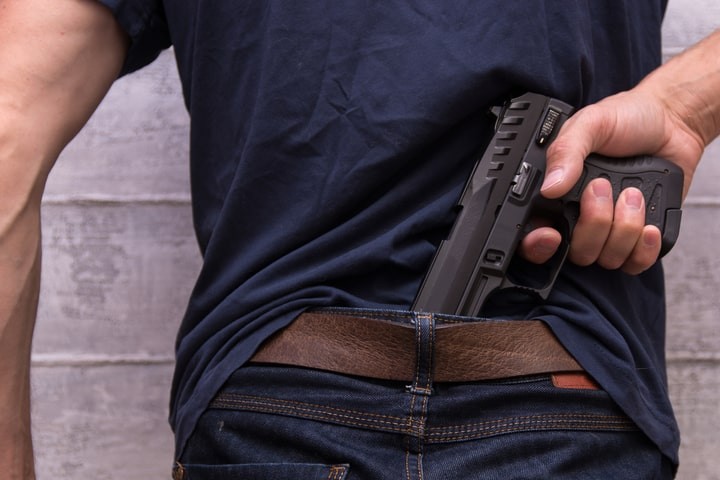
Unlawful carry of a weapon (UCW) in Texas refers to the illegal possession of handguns, clubs, illegal knives, or other harmful weapons. UCW is a Class A misdemeanor, punishable by up to 1 year in jail and a $4,000 fine. It involves knowingly or recklessly carrying a handgun or weapon where it’s banned. If done in restricted areas or by a felon, it becomes a third-degree felony.
Texans can receive an unlawful carrying of a weapon charge, even if they have a license to carry, for possessing restricted weapons in the wrong location or while committing another crime that is a Class B misdemeanor or higher.
Texas boasts a strong gun culture, but responsible gun ownership goes hand-in-hand with understanding the law. If you’re uncertain about the laws regarding carrying a firearm in Texas, you’re not alone.
Today, the San Antonio criminal defense attorneys of Austin Hagee Law Firm provide an overview of Texas’s unlawful carrying of a weapon or UCW law, including potential consequences and defenses against an illegal carrying of a weapon charge.
If you would like to share your story with a defense lawyer or if you have questions after reading this article, please contact us today by calling us at 726-223-6041.
What Is the Unlawful Carrying of a Weapon?
UCW (Unlawful Carrying of a Weapon) in Texas refers to the illegal possession of a handgun, club, or other dangerous weapon. This offense is typically a Class A misdemeanor but can escalate to a third-degree felony if certain factors are present, such as carrying in restricted areas or having a prior conviction. Fines for this charge reach up to $4,000 and may include up to one year in jail. In Texas, unlawful carry charges escalate to third-degree felonies if a firearm is brought into a business licensed to sell alcohol, such as bars or liquor stores.
Texas Penal Code Section 46.02 defines UCW as the intentional, knowing, or reckless carrying of:
- A handgun on or about your person, or
- Certain illegal knives or clubs.
Simply, unlawful carrying of a weapon in Texas applies when someone carries a handgun, knife, or club illegally. However, UCW is more than just a matter of weapon type. It also specifies who cannot carry a weapon and in what situations.
Who is Prohibited from Carrying a Weapon?
Several factors can make it illegal for you to carry a weapon in Texas:
- Age—you must be 21 or older to legally carry a handgun openly or concealed without a license to carry (LTC). However, 18-20 year olds may be able to carry, despite the Texas statute, under the federal court ruling found in Firearms Policy Coal., Inc. v. McCraw, 623 F. Supp. 3d 740 (N.D. Tex. 2022);
- Criminal history—past convictions for felonies and specific misdemeanors can disqualify you from carrying as well as trigger other charges at the state or federal level;
- Family violence finding—it is illegal to carry a firearm if a court issues an affirmative finding of family violence (AFV or AFFV) against you;
- Felony history—carrying a weapon is always illegal in public after a felony conviction;
- Residence—if it has been less than five years since your punishment ended for a non-family-violence felony, where you were convicted, than you cannot possess or carry a firearm even at your residence (only applies to felonies);
- Protective orders—an active protective order against you prohibiting firearm possession makes carrying unlawful; and
- Intoxication—it is illegal to carry a weapon outside of your home while under the influence of alcohol or drugs.
Additionally, individuals who have been legally determined as mentally unfit or involuntarily hospitalized in a mental institution are also prohibited from carrying a weapon in Texas. Being aware of these restrictions is crucial to prevent facing legal repercussions for UCW.
Where are Weapons Restricted?
Even if you’re legally permitted to carry, gun-free zones exist in various locations throughout the state. The following Texas zones prohibit firearms and certain weapons:
- Schools and most private universities;
- Government buildings;
- Court or the offices used by a court;
- Polling locations
- Prisons;
- Hospitals or nursing homes;
- Grounds of a civil commitment facility;
- Amusement parks;
- Racetracks;
- Airports, except in certain secured and properly permitted areas;
- Private businesses with posted “no weapons” signs under Texas Penal Code 30.06 and 30.07; and
- Public places with a 30.07 sign, if your weapon is not concealed, and you do not have a LTC.
However, you can generally carry a handgun:
- On a public college campus with a concealed weapon and a valid license to carry;
- On your own property or property under your control;
- Inside a motor vehicle or watercraft you own or control, with some limitations; and
- While directly en route to or from these locations.
Texas gun laws are complex and constantly evolving. A qualified criminal defense attorney will be aware of the most up-to-date information.
Unlawful Carrying Weapon in Texas: Punishments
In Texas, UCW charges pertain to the unlawful possession of firearms, knives, or clubs. This offense, categorized as a Class A misdemeanor, involves the illegal carrying of these weapons. However, under certain circumstances, such as prior convictions, it can escalate to a third-degree felony.
- Class A misdemeanor. UCW is most commonly charged as a Class A misdemeanor. The penalty is a fine of up to $4,000 and potential jail time of up to a year.
- Third-degree felony. Possessing a firearm, as a convicted felon, outside of your home is a third degree felony. This could result in imprisonment for 2 to 10 years and a $10,000 fine.
Underestimating the severity of an unlawful carrying of a weapon charge can have significant consequences. A conviction can affect your employment opportunities, housing options, and future right to own a gun.
Also, there are many legal ways for prosecutors to expand the range of punishment for a UCW charge. These enhancements vary based upon an individual’s previous convictions, the case facts, and whether the person has an affirmative finding of family violence on their record.
For these reasons, it is important to speak to an attorney with experience in Texas UCW laws to make sure your family fully understands the ramifications of your criminal case.
Carrying a Weapon While Committing Another Crime
You can be charged with a Class A UCW if you carry a weapon while committing another crime that is not a Class C misdemeanor. This holds true even if the underlying crime does not seem very serious, including the following:
- Reckless driving;
- Driving under the influence (DUI) or driving while intoxicated (DWI);
- Possession of marijuana;
- Possession of controlled substances, including vape pens; and
- Evading arrest.
This list is not exhaustive, and any number of underlying crimes or facts could qualify your UCW as a felony. It is essential to be aware of the different factors that can lead to a UCW charge in Texas and the potential severity of the consequences.
Defenses Against a UCW Charge in Texas
There are potential defenses available. Let’s explore some common strategies to fight a UCW charge in Texas.
- Mistake of fact. Did you believe you were in a lawful place to carry, unaware of signage or specific restrictions at this location? This defense hinges on a genuine and reasonable lack of knowledge about the legal status of the location.
- Unintentional possession. Were you unknowingly holding a friend’s weapon, or unaware that a gun had been placed or left in a bag in your vehicle? What about sharing a vehicle with a spouse that left the weapon discreetly in the vehicle? Demonstrating a lack of intent to knowingly carry strengthens this defense.
- Improper stop or search. If law enforcement stopped or searched you without probable cause, any evidence obtained could be deemed inadmissible. A skilled attorney can help determine if a violation of your Fourth Amendment rights took place and use this to suppress the illegally obtained evidence against you.
- No attached criminal charge. Often, a person is charged with UCW when they are charged for an attached DWI or other criminal offense. If you are not guilty of the underlying criminal charge, and can prove this in court, you are usually entitled to get the accompanying UCW charge against you dropped as well.
- Against public policy. An example of this would be getting a UCW charge when you are stopped for knowingly driving while your license is invalid. While technically, the license charge is enough to get you charged for UCW, a charge here really goes against the public policy behind the statute, i.e. stopping people from using weapons while committing crimes that threaten society. Most prosecutors would likely agree with dismissing a UCW charge, in a situation like this, to be aligned with the public policy intent behind the statute.
- License to carry. Possessing a valid LTC allows you to carry a concealed handgun in many places, significantly reducing the likelihood of a UCW charge and increasing your chance of having a valid legal defense.
- Traveling through Texas. Certain exceptions exist for travelers passing through the state if they comply with specific regulations regarding transporting firearms. Knowledge and compliance with these exceptions can be crucial.
- Temporary location change. Depending on the specific circumstances, this defense might be applicable if you were briefly on private property with a “no weapons” sign while making a delivery or using a restroom. This defense hinges on the actor’s knowledge and their intent in the situation.
Defenses can be complex and depend on the specifics of your case. The prosecution has the burden of proving the elements of UCW beyond a reasonable doubt. Your attorney should work with you to identify and exploit weaknesses in the prosecution’s case to build a strong defense.
Your rights matter. Let Austin Hagee Law Firm guide you through UCW defense with confidence.
The experienced legal team at Austin Hagee Law Firm is here to provide legal counsel, defense strategies, and support if you’re facing a UCW charge. Our in-depth knowledge of the latest gun laws and legal interpretations helps us to develop strong defense strategies in each case.
With a deep commitment to the South Texas community, our firm has earned a strong reputation for fiercely advocating for our clients’ best interests in legal venues throughout Texas.
Don’t hesitate to contact us today for a consultation. We’ll work tirelessly to achieve the best possible outcome in your case. Call at 726-223-6041.
